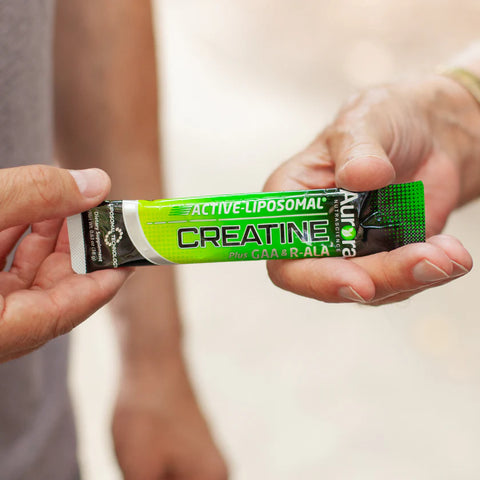When it comes to cognitive health, many people think of brain-boosting supplements like omega-3s or nootropics. But what if we told you that creatine, a well-known supplement in the fitness world, offers significant cognitive benefits too? In this blog post, we’ll dive into the science behind creatine’s role in brain health and explore how this supplement can enhance cognitive function.
What Is Creatine?
Creatine is a naturally occurring compound that helps your body produce energy. It’s primarily found in muscle cells, where it plays a key role in energy production during high-intensity physical activity. While creatine is most commonly associated with muscle strength and recovery, its influence extends beyond the gym—it can also benefit brain function.
Recent research has revealed that creatine has a significant impact on the brain’s energy supply, making it a promising supplement for cognitive health.
The Science Behind Creatine’s Cognitive Benefits
Your brain, like your muscles, requires a substantial amount of energy to function properly. In fact, the brain consumes up to 20% of your body’s total energy. Creatine helps increase the production of adenosine triphosphate (ATP), the body’s primary energy currency, providing an energy boost not only to your muscles but also to your brain.
Let’s take a closer look at the key findings from scientific studies:
- Improved Memory and Learning: Several studies have found that creatine supplementation improves memory and learning, particularly in tasks that require quick thinking and recall. A study conducted on young adults showed that participants who took creatine supplements performed better in memory tests compared to those who didn’t. This suggests that creatine can enhance cognitive functions related to information processing and retention.
- Reduced Mental Fatigue: Mental fatigue occurs when your brain becomes depleted of energy, especially after prolonged periods of concentration or problem-solving. Creatine helps by replenishing the brain’s energy stores, reducing mental fatigue and improving cognitive endurance. This is particularly beneficial for individuals who need to stay mentally sharp for extended periods, such as students or professionals.
- Enhanced Cognitive Performance Under Stress: Stressful situations—whether they are mental or physical—can drain the brain of energy, leading to decreased cognitive performance. Studies have shown that creatine supplementation helps improve mental performance in stressful conditions, such as sleep deprivation or intensive cognitive tasks. This is because creatine ensures a steady supply of ATP, allowing the brain to maintain its performance even under pressure.
- Support for Neurodegenerative Conditions: Creatine’s potential to protect the brain from neurodegenerative diseases like Alzheimer’s and Parkinson’s is a growing area of interest. While research is still in its early stages, some studies suggest that creatine may help prevent cognitive decline by supporting brain cell energy metabolism and reducing oxidative stress. This makes creatine a promising supplement for maintaining brain health as we age.
What the Research Shows
- Memory Enhancement: A study published in Psychopharmacology found that creatine supplementation significantly improved memory performance in healthy young adults, particularly in tasks that required short-term memory. The participants who took creatine performed better on cognitive tasks compared to the placebo group.
- Mental Fatigue Reduction: Research from the Journal of Applied Physiology showed that creatine supplementation helped reduce mental fatigue during prolonged cognitive tasks. Participants reported feeling less mentally tired and more focused when supplementing with creatine, indicating that it plays a key role in maintaining cognitive energy.
- Cognitive Support in Aging: Another study conducted on older adults found that creatine supplementation helped improve brain function, particularly in tasks requiring quick decision-making and recall. This suggests that creatine may have protective effects on cognitive function as we age, potentially delaying the onset of age-related cognitive decline.
Who Should Consider Creatine for Cognitive Health?
Creatine’s cognitive benefits make it a valuable supplement for a wide range of individuals:
- Students: Those who face mentally demanding tasks, such as studying for exams or learning new skills, can benefit from creatine’s ability to improve memory, focus, and cognitive endurance.
- Professionals: In high-pressure environments where multitasking and quick thinking are essential, creatine supplementation can help reduce mental fatigue and improve decision-making.
- Older Adults: As cognitive function tends to decline with age, creatine can support brain health and may help protect against neurodegenerative conditions.
How to Supplement with Creatine for Cognitive Health
For those interested in using creatine to boost cognitive function, the recommended dose is typically 3-5 grams per day, similar to the amount used for athletic performance. Creatine monohydrate is the most researched and trusted form of creatine, making it a safe and effective option for both physical and mental benefits.
Conclusion: The Dual Power of Creatine
The idea of creatine as just a muscle-building supplement is quickly changing as more research highlights its cognitive benefits. From improving memory and reducing mental fatigue to supporting brain health as we age, creatine offers a range of cognitive benefits that make it a valuable addition to any wellness routine.
At Vida Lifescience, we’re passionate about providing scientifically-backed supplements that enhance both body and mind. As research continues to uncover the power of creatine for brain health, it’s clear that this supplement is not just for athletes—it’s for anyone looking to support cognitive performance and overall well-being.



